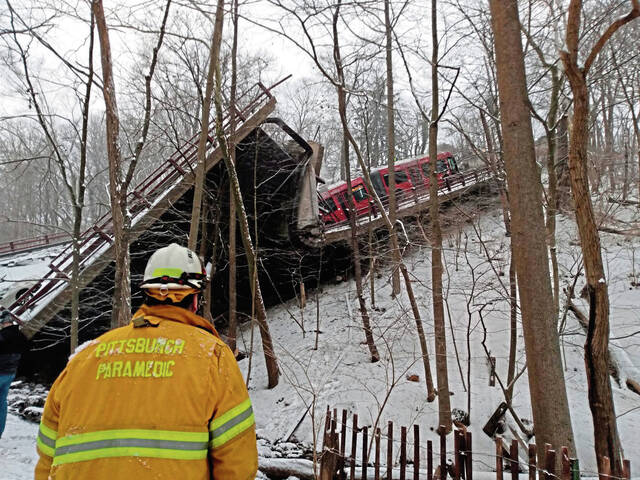A recent editorial and article about the Fern Hollow Bridge collapse overlook some key aspects of sovereign immunity and why damages caps are a necessary taxpayer protection.
The bridge collapse was indeed a tragedy, but to suggest that the city would have repaired the bridge if caps on lawsuits against the city were either non-existent or higher is pure speculation. The policy behind sovereign immunity aims to protect the state and its entities from excessive liability and financial burden, thus allowing them to fulfill their governmental functions effectively. Eliminating caps will open the flood gates for personal injury lawyers to raid the treasuries of state and local governments, with taxpayers being left holding the bag.
Pennsylvania statutory law grants the commonwealth, its officials and its employees sovereign and official immunity. Notably, there are circumstances where the commonwealth waives immunity and allows individuals to bring legal claims against government entities and subdivisions. However, along with the state giving permission to be sued comes the right to limit its liability exposure. Pennsylvania also allows local governments to be sued under certain exceptions to immunity.
The issue at hand is the threat of uncapped, runaway liability verdicts that could seriously damage state and/or local governments. And let us not forget that all governments — be it the local, state or federal levels — are funded by taxpayers. All it takes is one nuclear verdict (verdicts of $10 million or more) to wipe out funds set aside for critical government services. Allowing jackpot jury verdicts would mean less money for social services, housing and child welfare programs, fire and police departments, public schools and more. It would also inevitably lead to higher taxes for taxpayers to cover the costs.
There is nothing “shameful” about a Pennsylvania law that protects taxpayers from rapacious personal injury lawsuits that mainly enrich the lawyers. The Trib is incorrect in stating that civil lawsuits are about accountability. Nuclear verdicts are becoming more of the norm in Pennsylvania — so much so that it has earned our state the reputation as the worst judicial hellhole in the country.
Personal injury attorney Tom Kline stated in the article that “There’s no state in the union that has a more draconian cap than Pennsylvania.” What he should have said is no state does more to protect their taxpayers from the onslaught of lawsuits than Pennsylvania. Kline has embarked on a self-described “22-year odyssey” to remove taxpayer protection caps in suits against state and local governments.
In a petition to the Supreme Court urging that the Commonwealth Court be bypassed from considering his Freilich v SEPTA case, Kline made the argument that caps themselves are unconstitutional. The Supreme Court recently agreed to hear this case. If his theory prevails and the court strikes down the caps, taxpayers will face unlimited liability exposure. The Supreme Court itself cannot increase the damages caps. It can either strike them down or keep the current caps in place. Cap elimination would be a dream for contingency fee attorneys and an unmitigated disaster for taxpayers.
The state Legislative Budget and Finance Committee’s report on this topic found that more than 99% of claims against state and local governments fall within the current caps. In other words, more than 99% of injured victims find justice under the current reasonable limits that protect taxpayers. In fact, according to the Tribune-Review article, neither the city of Pittsburgh nor Allegheny County has paid a claim reaching the damage cap.
Caps on damages in cases against the state or a political subdivision (city, county, township, or school district) are put in place to protect taxpayers from personal injury attorneys who are seeking jackpot paydays. Trial lawyers spend an extraordinary amount of money on advertising in their quest to encourage lawsuits. The American Tort Reform Association reports that trial lawyers in Pennsylvania spent $162 million on 1.43 million advertisements in 2023. Clearly, the lawyers have plenty of expendable funds. If personal injury attorneys can dedicate this exorbitant amount of money on advertisements encouraging lawsuits, it’s reasonable to assume they could just as easily reduce their fees (which help to pay for these ads) so that victims take home more for their injuries.
Instead of calling for weaker taxpayer protections, there should be an outcry to reduce attorney contingency fees in these cases, so injured victims actually take home more money, rather than personal injury attorneys siphoning off a large portion of the recovery. By addressing contingency fees, both taxpayers and the injured party would be protected.
It is easy to get swept up in the emotional messaging being pushed by personal injury attorneys. It’s designed to tug at the heartstrings. But it’s important to remember that sovereign immunity and caps on damages were put in place to protect the taxpayer. Personal injury attorneys shouldn’t be able to line their pockets at the expense of victims and taxpayers. Caps on damages in cases against state and local governments are an important taxpayer protection and should not be eliminated.
Curt Schroder is executive director of the Pennsylvania Coalition for Civil Justice Reform, a not-for-profit, nonpartisan advocacy organization committed to bringing fairness to Pennsylvania’s courts by raising awareness of civil justice issues and advocating for legal reform.








